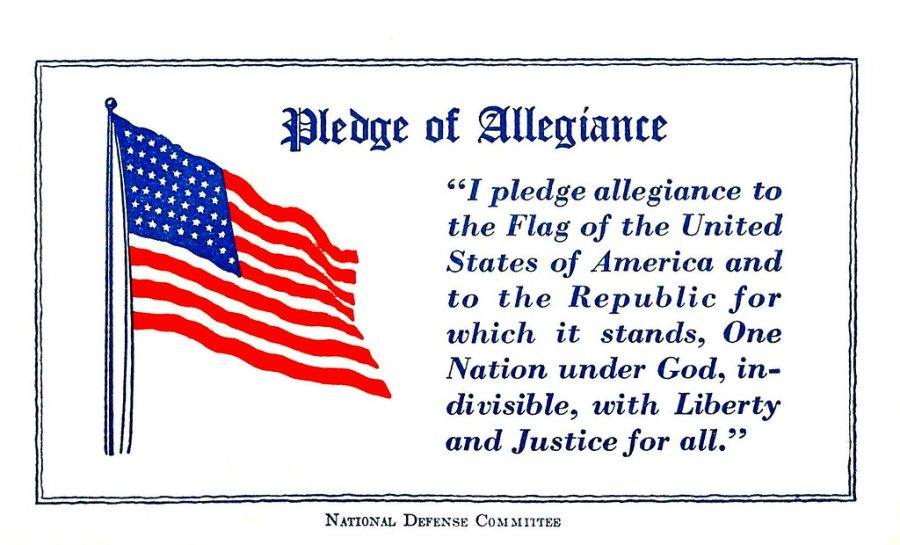Pledge or No Pledge?
June 3, 2022
The following article contains two Op-Eds written by our Managing Editors, each editor expressing her opinion on the Pledge of Allegiance.
Op-Ed by Arcadia Hinton-Cooley
I don’t remember learning the pledge of allegiance. It must’ve been when I was four or five, during my first year in the public school system. I imagine it must take a good deal of time and effort to instill all 31 words of the pledge into the minds of children fresh out of preschool.
Fourteen years later, these words that I’ve had to recite at least 2500 times — “I pledge allegiance to the Flag of the United States of America, and to the Republic for which it stands, one Nation under God, indivisible, with liberty and justice for all” — have become controversial, and many people refuse to stand for it. Many argue that the use of the word “God” violates religious freedom. Others feel that the phrase “liberty and justice for all” is ignorant of the injustices present in America. Still others refuse to pledge allegiance to a government whose actions they don’t agree with.
But picking apart the precise wording of the pledge of allegiance is missing the larger point.
The pledge was originally written for citizens of all countries, simply stating: “I pledge allegiance to my Flag and the Republic for which it stands, one nation, indivisible, with liberty and justice for all.” It was a celebration of nationality that could be used by anybody. By picking it apart, the pledge has become political when it should be about celebrating ideal values to strive for as a country.
You can disagree with the actions of your government and still appreciate the privileges you have in your country. Swearing an oath to your country doesn’t mean agreeing with every aspect of it. No country is perfect, and its simply unrealistic to expect to personally agree with every law and decision the government makes. What’s more important is taking pride in the values of liberty and justice that we will fight for to make our country better.
Our pledge reminds us of the privilege we have to live in a democracy and serves as a reminder of the equality we strive for. Especially at the front of the war between Ukraine and Russia, the pledge is a reminder that we are lucky to be where we are. And with the recent news of Roe v. Wade being overturned, saying the pledge is agreeing to keep fighting for women’s freedom over their bodies in the name of liberty. For these reasons, I will keep saying the pledge. Will you?
Op-Ed by Poorvi Sarkar
Approximately 8:45, the announcements are a squirrel that has jumped onto the highway while you drive 65 mph – students spark awake to listen to the school’s daily updates and chime in for a factoid about a significant woman this National Women’s Month. Leading that list is America’s sign-off, the Pledge of Allegiance, a daily oath and swearing honor to this country. Given its problems, it is undeniable the sheer privilege Americans have to just live here, and honoring the nation, many say, is a way of giving thanks, and respecting that privilege. Yet many students opt in Kaepernick’s favor in not participating in the oath.
“I’m just lazy”, one student says, but she elaborates saying, “the last line says ‘One nation under God’ and I just don’t agree with that”. The strong-headedness of this generation marks the deep indignation that is fundamental of Gen-Z, and while it may be an exaggeration to accredit Henry David Thoreau in this case, civil disobedience plays a role in every day life. A form of “protest”, wherein the party who disagrees simply does not participate has become the cornerstone of change in America, if not across the globe, seen in the Civil Rights Movement, Women’s Liberation Movement, Gay Liberation Movement, and hundreds of other protests across the world. Many students refuse to stand, or simply don’t want to pledge themselves under God, and are indivisible with “justice and liberty for all” because while that has been America’s tagline, the tangible action isn’t truly seen. While again, it is a privilege to be born here and protest this idea itself, it is a mark of a progressive society to have disagreement.
One teacher told the class, “I don’t really see [students] standing up anymore”, suggesting whether this has become an outdated practice, no longer politically correct, or simply an unwanted force of movement at 8 am. While it is seen that most teachers still do stand for the pledge, it also brings into question whether it is a force of habit at this point of a presumably long career where the practice is commonplace.
Some may suggest that it is similar to the Hippocratic Oath, in the sense that it is a vow to honor the duties of being a member of a certain profession or group, and to uphold those ethical values. However doctors do not recite the oath every time they prescribe cold medicine, let alone perform a surgical procedure – so why does the pledge stand still? Gen-Z has taken the world by storm (sometimes even on the Capitol), and surely has some pointed views on politics, on both sides. The generation has found ways to expand inclusivity to many new vantage points while also (rightfully) being criticized for being overly judgemental and bringing harmful norms like cancel culture to society’s plate.
So sure, maybe Gen-Z is just too lazy to stand for a phrase acknowledging their allegiance to this country, or maybe it’s the sign of peeling glue off a 90 year old sticker blindly slapped onto the forehead of young Americans saying, “I wholly and fully agree and dedicate myself to this nation”. It’s hard to tell – but what’s for sure: this generation of students will stand (or won’t) for what they believe in.
